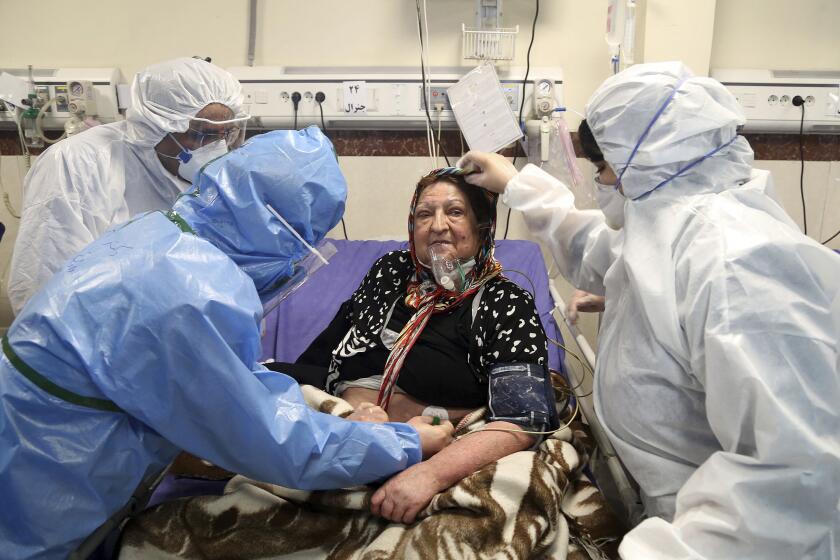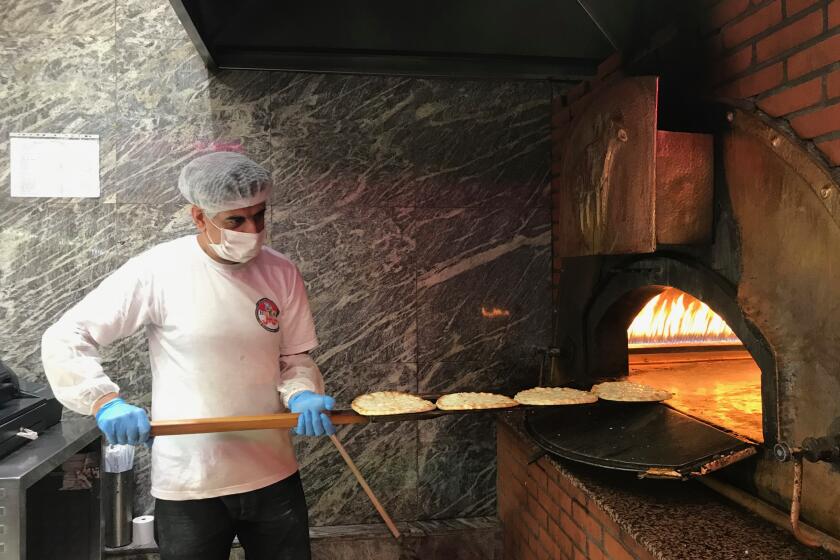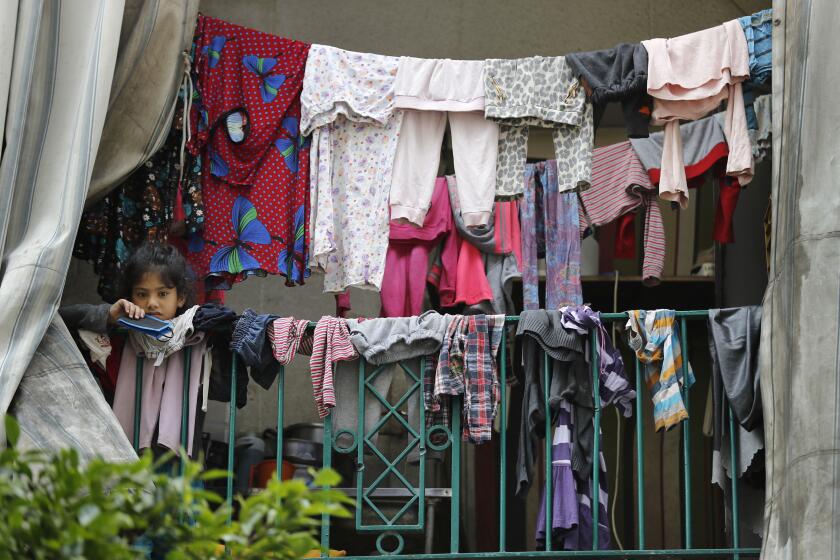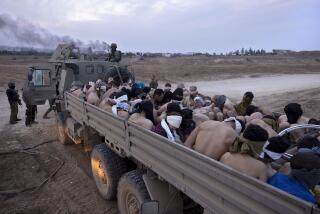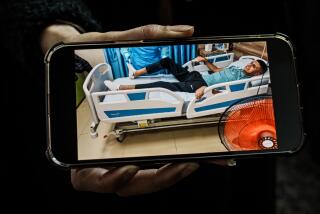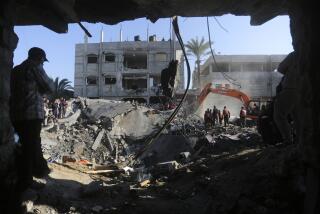Egypt arrests doctors, silences critics amid Arab world’s highest COVID-19 death toll
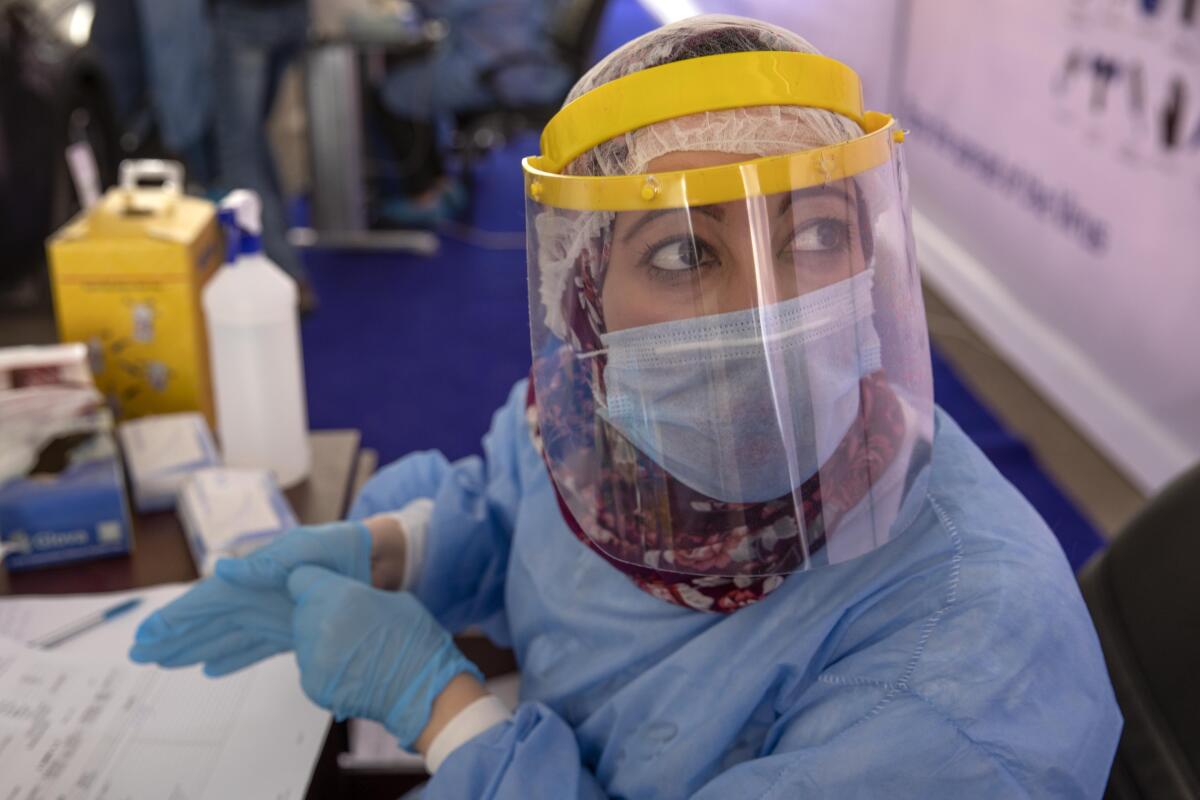
- Share via
A doctor arrested after writing an article about Egypt’s fragile health system. A pharmacist picked up from work after posting online about a shortage of protective gear. An editor taken from his home after questioning official coronavirus figures. A pregnant doctor arrested after a colleague used her phone to report a suspected coronavirus case.
As Egyptian authorities fight the swelling coronavirus outbreak, security agencies have tried to stifle criticism of the government’s handling of the health crisis.
At least 10 doctors and as many as 10 journalists have been arrested since the virus hit Egypt in February, according to rights groups. Other health workers say they have been warned by administrators to keep quiet or face punishment. One foreign correspondent has fled the country, fearing arrest, and two others have been reprimanded over “professional violations.”
The coronavirus is surging in the country of 100 million, threatening to overwhelm hospitals. As of Monday, the Health Ministry recorded 76,253 infections, including 3,343 deaths — the highest death toll in the Arab world.
“Every day I go to work, I sacrifice myself and my whole family,” said a doctor in greater Cairo, who spoke on condition of anonymity for fear of reprisals, like all doctors interviewed for this story. “Then they arrest my colleagues to send us a message. I see no light on the horizon.”
In 2013, Abdel Fattah Sisi, then Egypt’s defense minister, led the military’s removal of the country’s first democratically elected president, Mohamed Morsi, after his brief rule sparked nationwide protests. Since then, as president, Sisi has crushed dissent, jailing Islamist political opponents, secular activists, journalists, even belly dancers.
In the battle for regional influence, coronavirus worries make Middle East countries vulnerable to disinformation campaigns.
Now the clampdown has extended to doctors who speak out about their working conditions.
A government press officer did not respond to requests for comment on the arrests of doctors and journalists.
In recent weeks, authorities have marshaled medical supplies to prepare for more patients. The military has set up field hospitals with 4,000 beds, scaled up testing and ordered companies to churn out face masks and other supplies.
But health workers are sounding the alarm on social media. Doctors say they are forced to purchase surgical masks with their meager salaries. Families plead for intensive care beds.
The Lebanese are used to eating plenty of meat, but the country’s economic woes have made it a luxury as rampant inflation takes its toll.
The pandemic has pushed the Egyptian Medical Syndicate, a nonpolitical professional group, into a new role as the sole advocate for doctors’ rights. Last month, the union released a letter to the public prosecutor demanding the release of five doctors detained for expressing opinions about the virus response.
Another syndicate member, Mohamed Fawal, landed in jail last week, after demanding online that the prime minister apologize for comments that appeared to blame health workers for an increase in deaths.
Incensed doctors hit back, saying they’re undertrained, underpaid, under-resourced and struggling to save patients. So far, 117 doctors, 39 nurses and 32 pharmacists have died of COVID-19, according to syndicate members’ counts. Thousands have fallen ill.
Security forces shut down a syndicate news conference that was intended to respond to the prime minister’s comments and discuss supply shortages, according to former leader Mona Mina.
“These doctors have no history of activism. They were arrested because they offered criticism of their very specific professional circumstances,” said Amr Magdi of Human Rights Watch, which has confirmed the arrests of eight doctors and two pharmacists. Two have been released, he said, while the rest remain in pre-trial detention.
In one case, security agents burst into the home of Hany Bakr, an ophthalmologist north of Cairo, according to his lawyer and Amnesty International, over his Facebook post that criticized the government for sending aid to Italy and China while Egypt’s doctors were short of equipment.
In March, public prosecutors accused 26-year-old Alaa Shaaban Hamida of terrorism charges after she let a colleague call the government coronavirus hotline from her phone instead of first reporting the case to her managers, according to Amnesty International. Three months pregnant, she remains in pre-trial detention.
Doctors in three provinces say administrators threatened to report them if they publicly expressed frustration toward authorities or failed to show up for work.
Discrimination and racial prejudices in the Middle East take on re-energized focus in wake of George Floyd’s death.
The suppression of criticism in Egypt is hardly unusual, analysts say, but the government has become more jittery as the pandemic tests its capabilities and the economy.
With borders shut and planes idled, Egypt’s critical tourism revenue has vanished. Last week, fearing further economic fallout, the government reopened much of society and welcomed hundreds of international tourists to resorts, even as daily reported deaths exceeded 80.
“Because of Egypt’s constant attention to its image as a place open for tourism, open for business, open for investment, authorities appear particularly sensitive to divergent perspectives during the pandemic,” said Amy Hawthorne, an Egypt expert at the Project on Middle East Democracy.
At least 15 individuals have been arrested for broadcasting “false news” about the pandemic, said the United Nations human rights office. Four Egyptian journalists who reported on the outbreak remain in prison, according to the Committee to Protect Journalists, which has labeled Egypt among the world’s worst jailers of journalists, along with Turkey and China.
In March, Egypt expelled a reporter for the Guardian who cited a report disputing the official virus count. Egypt’s state information body summoned the Washington Post and New York Times correspondents over their critical coverage during the pandemic.
Despite growing human rights abuses, the international community counts on Egypt as a bulwark against regional instability, said a Middle East-focused rights advocate at the U.N., speaking on condition of anonymity to discuss policy matters.
“There is no appetite to address what is going on in Egypt,” the advocate said, “let alone sanction them in any way for what the government is doing to their own people.”
More to Read
Sign up for Essential California
The most important California stories and recommendations in your inbox every morning.
You may occasionally receive promotional content from the Los Angeles Times.
